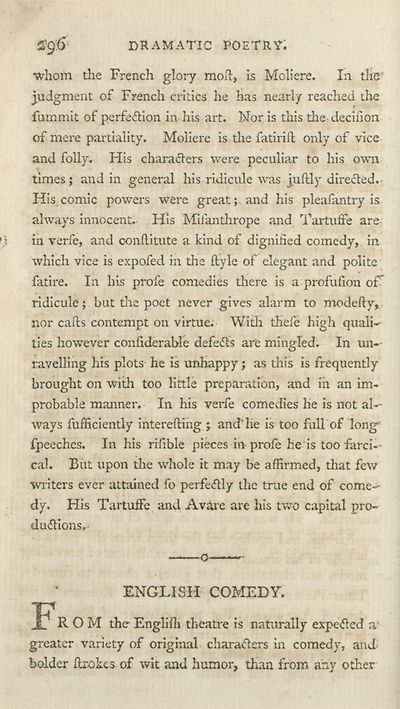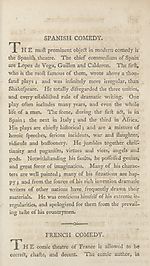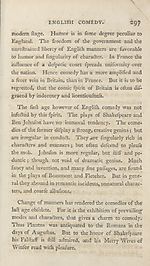Download files
Complete book:
Individual page:
Thumbnail gallery: Grid view | List view

£'96 DRAMATIC POETRY.
■whom the French glory moft, is Moliere. In the
judgment of French critics he has nearly reached the
fummit of perfettion in his art. Nor is this the decifion
of mere partiality. Moliere is tlie fatirift only of vice
and folly. His charadlers -were peculiar to his own
times; and in general his ridicule was juftly directed.
His.comic powers were great; and his pleafantry is
always innocent.. His Milanthrope and Tartuffe are
in verfe, and conftitute a kind of dignified comedy, in
which vice is expofed in die ftyle of elegant and polite
fatire. In his profe comedies die re is a profufion of”
ridicule; but die poet never gives alarm to modefty,
nor calls contempt on virtue. Widi thefe high quali¬
ties however confiderable defeats are mingled. In un¬
ravelling his plots he is unhappy; as this is frequently
brought on with too little preparation, and in an im¬
probable manner. In his verfe comedies he is not al¬
ways fufficiently interefting ; and'he is too full of long'
fpeechcs. In his rifible pieces in prole he is too farci¬
cal. But upon die whole it may be affirmed, that few
writers ever attained fo perfe<511y the true end of come¬
dy. His Tartuffe and Avare are his two capital pro-
duftions.
ENGLISH COMEDY.
ROM the Englifii theatre is naturally expefted a-
greater variety of original characters in comedy, and
bolder fixokes of wit and humor, than from any other
■whom the French glory moft, is Moliere. In the
judgment of French critics he has nearly reached the
fummit of perfettion in his art. Nor is this the decifion
of mere partiality. Moliere is tlie fatirift only of vice
and folly. His charadlers -were peculiar to his own
times; and in general his ridicule was juftly directed.
His.comic powers were great; and his pleafantry is
always innocent.. His Milanthrope and Tartuffe are
in verfe, and conftitute a kind of dignified comedy, in
which vice is expofed in die ftyle of elegant and polite
fatire. In his profe comedies die re is a profufion of”
ridicule; but die poet never gives alarm to modefty,
nor calls contempt on virtue. Widi thefe high quali¬
ties however confiderable defeats are mingled. In un¬
ravelling his plots he is unhappy; as this is frequently
brought on with too little preparation, and in an im¬
probable manner. In his verfe comedies he is not al¬
ways fufficiently interefting ; and'he is too full of long'
fpeechcs. In his rifible pieces in prole he is too farci¬
cal. But upon die whole it may be affirmed, that few
writers ever attained fo perfe<511y the true end of come¬
dy. His Tartuffe and Avare are his two capital pro-
duftions.
ENGLISH COMEDY.
ROM the Englifii theatre is naturally expefted a-
greater variety of original characters in comedy, and
bolder fixokes of wit and humor, than from any other
Set display mode to:
![]() Universal Viewer |
Universal Viewer | ![]() Mirador |
Large image | Transcription
Mirador |
Large image | Transcription
| Antiquarian books of Scotland > Languages & literature > Abridgement of lectures on rhetoric > (312) |
|---|
| Permanent URL | https://digital.nls.uk/135470198 |
|---|
| Description | Thousands of printed books from the Antiquarian Books of Scotland collection which dates from 1641 to the 1980s. The collection consists of 14,800 books which were published in Scotland or have a Scottish connection, e.g. through the author, printer or owner. Subjects covered include sport, education, diseases, adventure, occupations, Jacobites, politics and religion. Among the 29 languages represented are English, Gaelic, Italian, French, Russian and Swedish. |
|---|

